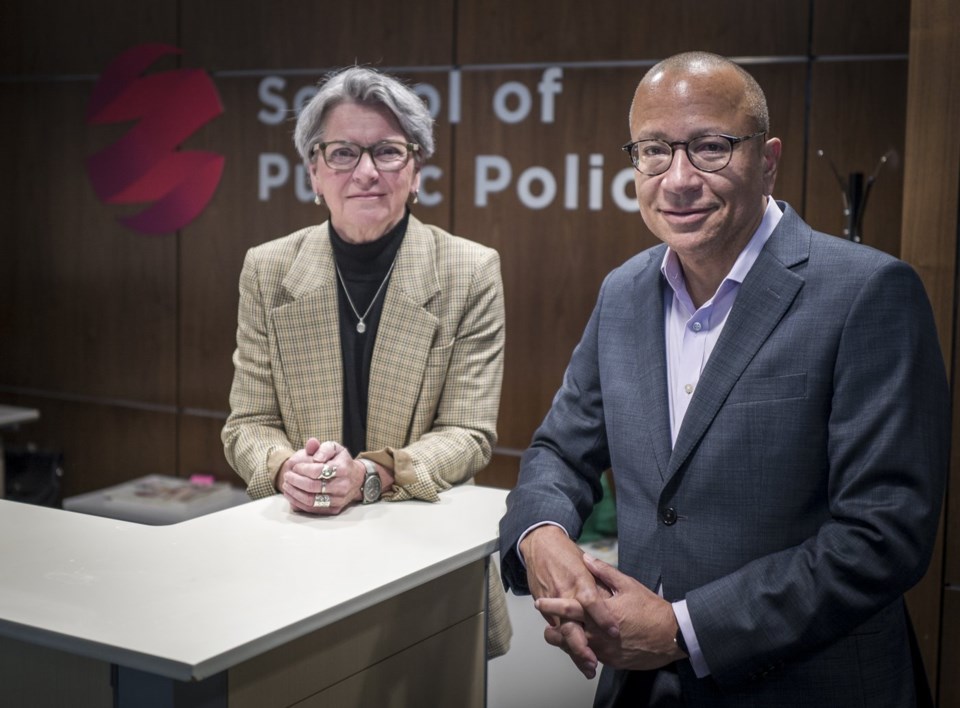CALGARY — Alberta is putting $6.5 million toward a new initiative at the University of Calgary to study how Canada's relationship with the United States is changing with U.S. President Trump in the White House.
"It's no secret that our relationship has hit a rocky patch these past few months," said Premier Danielle Smith on Friday. "And while tensions have ridden high, let us be clear — this relationship is far from over."
The funds, to be provided over three years, will establish the New North America Initiative based in the university's School of Public Policy. Researchers will be tasked with developing a vision of what the continental relationship could become at a time of increasing trade uncertainty and geopolitical turmoil.
"I think it's clear to everyone that we aren't going back to where we were a few years ago, or even during the first Trump administration," said Carlo Dade, the School of Public Policy's international policy director.
Trump's first administration turned into a stress test for the federal government when he hit Canada with steel and aluminum tariffs and ripped up the North American Free Trade Agreement.
Negotiations on the deal that replaced NAFTA — the Canada-U.S.-Mexico Agreement on trade, or CUSMA — were tense and former prime minister Justin Trudeau had a notoriously rocky relationship with Trump. The continental trade pact was still hailed a success.
Canadians who expected to see the friendly bilateral relationship with the U.S. restored with the passage of CUSMA were taken aback by the unprecedented tariffs and annexation threats that accompanied Trump's return to the White House.
Many were appalled when Canada became an early target of the president’s insults — but many never expected Trump to follow through on his tariff threats.
"We have consistently misjudged what a Trump administration will do," Dade said.
Trump hit Canada with economywide duties in March, then partially walked them back a few days later for imports compliant with CUSMA. Canada is also being hit with levies on steel, aluminum and automobiles.
Canada can no longer continue "driving forward by looking in the rear-view mirror instead of looking clearly at what lies ahead and what's coming," Dade said. Canadians must abandon their nostalgic attachment to the old relationship, he said, and imagine instead what it could become.
The university's initiative will have interrelated parts. It will conduct research on immediate challenges facing Albertans due to the deterioration of relations with the U.S. It also will set up collaboration between Albertans and researchers at American universities to help them better understand each other.
Martha Hall Findlay, director of the School of Public Policy, said in a media statement that "we need new thinking and new ways of engaging, and we need the work behind this to come from new places and new voices on both sides of the border."
Dade said the fact that the work will be done outside both Ottawa and Washington will help it break away from traditional thinking and come up with ideas to solve problems facing both countries.
Provincial Minister of Advanced Education Rajan Sawhney said there is very little research dedicated to the study of Canada-U.S. relations at Canadian universities, and it too often "fails to reflect the priorities or even the realities of Western Canada."
The new Alberta initiative comes after Trump signed an executive order to essentially shut down an influential think tank Canadians have used for many years to get their messages out in Washington, D.C.
The March order shuttered nearly all operations at the Wilson Center and terminated its Canada Institute.
Christopher Sands, who was the Canada Institute's director, said it's essential that Canadians continue to have meaningful conversations with Americans as the relationship between the two countries changes.
"We've come to the end of what we will look back on as being a very special period in the relationship," said Sands, director of Johns Hopkins University's Center for Canadian Studies.
Canadians were "lulled into a sense of false complacency," Sands said, but Trump's tariffs have shown the need for urgent action. Canada can no longer assume that everything will go back to normal, he said.
Shifting American views on Canada and trade suggest that think tanks also need to adapt, Sands said. The New North America Initiative could meet the moment, he added.
Dade said the initiative will also listen to voices in what he calls the "New Right" and "New Left" to understand what could come after the current Trump administration.
"We need to know who these people are before they suddenly start imposing tariffs," he said.
— By Kelly Geraldine Malone in Washington, D.C.
This report by The Canadian Press was first published May 16, 2025.
The Canadian Press



